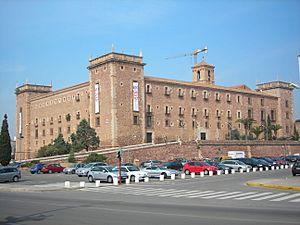Monastery of Santa Maria, El Puig facts for kids
The Monasterio de Santa Maria is a beautiful old building in the town of El Puig, which is in the province of Valencia, Spain. It's a special place because it has both a church built in the Gothic style and a monastery built in the Renaissance style.
Contents
History of the Monastery
How the Monastery Began
The story of the Monasterio de Santa Maria started a long time ago, in 1237. A powerful ruler named King Jaume I decided to build a church on a hill in El Puig. This happened after a priest named Peter Nolasco made an amazing discovery. He found a special old picture, called a Byzantine icon, hidden under a fallen bell. This icon was of Our Lady of the Angels (Nuestra Señora de los Ángeles).
People believed this icon had survived a time when the Moors, who were Muslims, ruled parts of Spain. The church was finished by 1240. It became connected with the Mercedarian order, which was a group of monks.
Building the Bigger Church and Monastery
Soon, many people, called pilgrims, started visiting the church. They came to ask for blessings from the icon, which was seen as the special protector of the Kingdom of Valencia. The first church became too small for all the visitors. So, in 1300, a much larger church was built in the Gothic style.
Later, in 1588, the impressive monastery building was added. This is the large complex you see today.
What You Can See Inside
When you visit the monastery, you can explore several interesting parts:
- The cloisters: These are peaceful open courtyards with covered walkways.
- The Salón Real: This is a grand hall that kings and queens used when they visited Valencia.
- The Salón Gótico of Jaume I: This is a Gothic-style hall named after King Jaume I.
- The Salón of Ceramics: This room displays beautiful ceramic art.
Protecting the Monastery
Its Many Uses Over Time
Since the 1800s, the monastery has been used for many different things. It has adapted and changed over the years, but its historical importance has always remained.
A Protected Landmark
The Monasterio de Santa Maria is considered a very important historical building in Spain. It has been officially protected since 1969. At first, it was called a Monumento Histórico-Artístico Nacional. Now, it is known as a Bien de Interés Cultural, which means it's a "Property of Cultural Interest." This helps make sure this amazing piece of history is preserved for future generations to enjoy.
See also
 In Spanish: Monasterio de Santa María (El Puig) para niños
In Spanish: Monasterio de Santa María (El Puig) para niños
 | John T. Biggers |
 | Thomas Blackshear |
 | Mark Bradford |
 | Beverly Buchanan |


